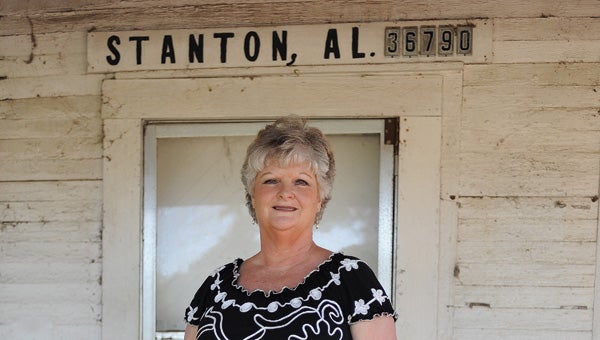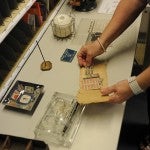
By Stephen Dawkins
Carol Harrison wakes up early each morning and goes to work at the only job she’s ever known.
Harrison, a lifelong resident of Stanton who has been married to her high school sweetheart for 41 years, could walk there if she wanted, but she drives just so she will have a vehicle if she needs it.
Harrison has been at the Stanton Post Office for 21 years, and her family’s history there goes back much further.
Harrison’s grandmother, Mildred Burnett, worked at the same post office for 50 years; and Harrison’s mother, Mary Agnes Friday, retired after 60 years of service.
“My mother, Mary Friday, started working for my grandmother when she was 13 years of age,” Harrison said. “They had the Wartime Act–all the men were off at war–so people were allowed to start work younger. She hired her to come in and help when she was 13.” When Friday started, Franklin D. Roosevelt had just been re-elected, Casablanca was the most popular movie in the world and a first-class stamp cost 3 cents.
Harrison became a third-generation postmaster in May 2006. The family’s postal tradition goes back to Harrison’s great-grandfather, a Swedish immigrant who came to the United States in 1877. He became postmaster in Decatur, Ga. “He later moved to Stanton, where he met my great-grandmother and married her,” Harrison said.

The Stanton post office opened in 1883 in an old lumber mill office. Edward G. Gregory was the first postmaster, and Harrison is the 13th. Along the way, it’s been like a storybook for Harrison. While other places and other lines of work may have their rush and their conflict, Harrison recalls good memories. One day, she heard a distinct ticking noise while handling a package. She notified authorities, thinking it could be a bomb. It was only a wind-up clock someone had ordered, and Harrison looks back and laughs.
“Everybody here has known everybody else all their lives,” Harrison said and added that the post office is part of the community’s identity. That’s why she loves it. “It’s important. People come in and ask have you heard from so-and-so today–how their surgery went.”
The post office moved into a new building, just steps from the old one, about 15 years ago. It was a welcomed change for the employees–the old building didn’t have a restroom or even running water–but Harrison said some locals preferred the old building.
“They had rather go to the old post office because that’s what they were used to doing,” she said.
There are only two employees other than Harrison at the Stanton Post Office: Linda Atcheson, the postmaster relief; and Johnny Higginbotham, a mail carrier that drives in from Maplesville.
“It’s just part of my family to me,” Harrison said. “Even when I was a child, I helped my grandmother at the post office.”
Many things are the same as when Harrison first started helping, as a child. For example, you can bet that William Hayes will be the first person in every morning to check his mail.
But like everything in life, even in Stanton, things change eventually. A bag of mail is no longer hung on a pole over the railroad tracks to be snatched by a passing train, for starters.
Perhaps most significantly, though, the next postmaster likely won’t be one of Harrison’s two daughters.
“My daughter Dana would absolutely love to, but things are different now,” Harrison said. “Now, you have to start out part-time, but she needs a full-time job. And now you can’t hire anybody that is kin to you.
“That makes me sad, to know that when I retire here that part of my family is no longer with us.”
There are other differences between now and when Harrison first started at the post office: information is entered on a computer instead of into a book, the government has added stacks of paperwork to be completed, and there are endless bar codes to be scanned.
Still, it’s a job that means much to Harrison and the community.
“I just like dealing with the people and delivering the mail,” she said. “It’s just the people. I don’t know what I would have done if I couldn’t have stayed in it. It would’ve been like losing a family member.”
